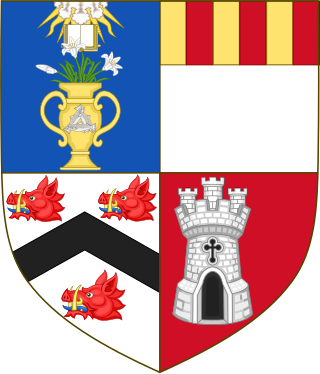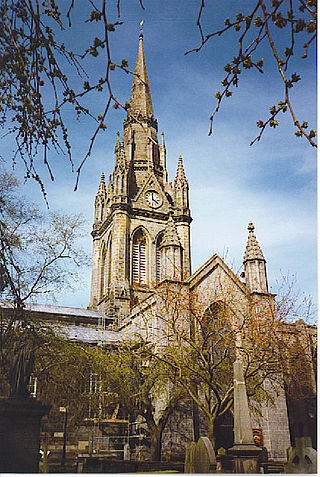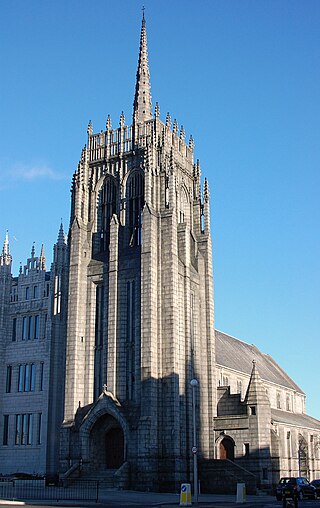
The University of Aberdeen is a public research university in Aberdeen, Scotland. It was founded in 1495 when William Elphinstone, Bishop of Aberdeen and Chancellor of Scotland, petitioned Pope Alexander VI on behalf of James IV, King of Scots to establish King's College, making it one of Scotland's four ancient universities and the fifth-oldest university in the English-speaking world. Along with the universities of St Andrews, Glasgow, and Edinburgh, the university was part of the Scottish Enlightenment during the 18th century.

Marischal College is a large granite building on Broad Street in the centre of Aberdeen in north-east Scotland, and since 2011 has been the headquarters of Aberdeen City Council. The building was constructed for and is on long-term lease from the University of Aberdeen, which still uses parts of the building to store its museum collections. Today, it provides corporate office space and public access to council services, adjacent to the Town House, the city's historic seat of local government. It is the second largest granite building in the world.

King's College in Old Aberdeen, Scotland, the full title of which is The University and King's College of Aberdeen, is a formerly independent university founded in 1495 and now an integral part of the University of Aberdeen. Its historic buildings are the centrepiece of the University of Aberdeen's Old Aberdeen campus, often known as the King's or King's College campus.

St Machar's Cathedral is a Church of Scotland church in Aberdeen, Scotland, located to the north of the city centre, in the former burgh of Old Aberdeen. Technically, St Machar's is no longer a cathedral but rather a high kirk, as it has not been the seat of a bishop since 1690.

The Kirk of St Nicholas is a historic church located in the city centre of Aberdeen, Scotland. Up until the dissolution of the congregation on 31 December 2020, it was known as the "Kirk of St Nicholas Uniting". It is also known as "The Mither Kirk" of the city. As of 1 January 2021, the building falls under the care and maintenance of the General Trustees of the Church of Scotland.
The Aberdeen doctors or doctors of Aberdeen were six divines working at Marischal College and King's College in Aberdeen, Scotland in the seventeenth century. Until 1635, they enjoyed the leadership of Patrick Forbes, Bishop of Aberdeen. They are distinguished not only for their positions at Aberdeen, but also by their irenicist opposition to the National Covenant of 1638. Their adherence to Episcopacy and their support for the Articles of the Assembly at Perth (1618), which prescribed several English forms of worship, form the backdrop of their opposition to the Presbyterian Covenanters.

George Keith, 5th Earl Marischal (c. 1553–1623) was a Scottish nobleman and Earl Marischal. He succeeded as earl on 7 October 1581, upon the death of his grandfather, William Keith, 4th Earl Marischal.
The Lord Rector of the University of Aberdeen is the students' representative and chairperson in the University Court of the University of Aberdeen. The position is rarely known by its full title and most often referred to simply as "Rector". The rector is elected by students of the university and serves a three-year term. Although the position has existed since 1495, it was only officially made the students' representative in 1860.

Colinton Parish Church is a congregation of the Church of Scotland. The church building is located in Dell Road, Colinton, Edinburgh, Scotland next to the Water of Leith.
Sir William Fordyce was a Scottish physician.
The Sheriff of Aberdeen was a royal official who was responsible for enforcing justice in Aberdeenshire, Scotland. Prior to 1748 most sheriffdoms were held on a hereditary basis. From that date, following the Jacobite uprising of 1745, they were replaced by salaried sheriff-deputies, qualified advocates who were members of the Scottish Bar.
Events from the year 1593 in the Kingdom of Scotland.

Greyfriars Church is a Category A Listed building in Aberdeen, Scotland. It was designed by the architect Alexander Marshall Mackenzie and built in 1903. It is situated on Broad Street and forms the south-east corner of Marischal College, also designed by Mackenzie.
John Row, born 1598, was the second son of John Row, minister of Carnock, and grandson of John Row, the Reformer. He educated at University of St Andrews graduating with an M.A. in 1617. He was elected schoolmaster of Kirkcaldy 2 November 1619, resigning before 25 November 1628. He was licensed by the Presbytery of Dalkeith 29 September 1631 and became tutor to George Hay, afterwards second Earl of Kinnoul, by whose father, the Lord Chancellor's recommendation, he was appointed master of the Grammar School of Perth in June 1632. He was ordained to Third Charge, Aberdeen, 14 December 1641 and appointed on 23rd November 1642 as lecturer on Hebrew in Marischal College. He was so actively engaged in support of the Covenanting party that on the approach of Montrose to Aberdeen in 1646 he was compelled to take refuge in Dunnottar Castle. Row was appointed by the General Assembly in 1647 to revise the new version of the Psalms from 90 to 120. He was a member of the Commission of Assembly in 1648, and of Commission for visiting the University of Aberdeen 31 July 1649. John Row joined the Independents and was admitted to a church of that persuasion in Edinburgh. He was promoted to Principalship of King's College in Aberdeen in September 1652. He resigned in 1661, and thereafter kept a school in Aberdeen. He died at the manse of Kinellar in October 1672 and was buried at Kinellar.
Robert Paterson (c.1635–1717) was a Scottish academic who served as Principal of Marischal College from 1679 to 1717.

Thomas Blackwell (1660–1728) was a Church of Scotland minister who was principal of Marischal College in Aberdeen from 1717 to 1728.
The Chancellor of the University of Aberdeen is the titular head of the institution and President of the General Council. The Chancellor is elected by the university's graduate body, the General Council, and the role may be held for life. The main responsibilities of the role are to be an ambassador for the university, and to undertake other ceremonial duties, including conferring degrees on graduands on occasion.











